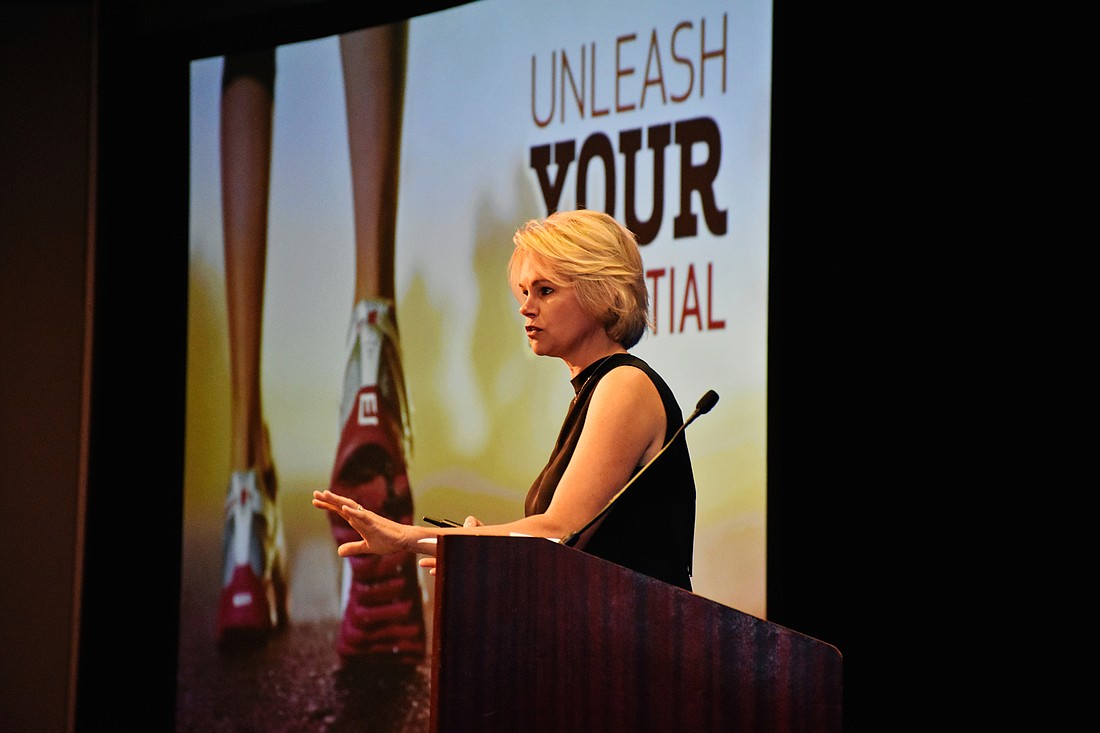- March 31, 2025
-
-
Loading

Loading

The world of sports, like real estate, involves some high-stake situations.
For 20 years, Molly Fletcher lived in that world. She was a successful sports agent, recruiting and representing big names, from baseball pitcher John Smoltz to broadcaster Erin Andrews. Now a national motivational speaker and entrepreneur, Fletcher, dubbed the “female Jerry Maguire” by CNN, according to her website, was recently one of the headliners at the Michael Saunders & Co. real estate brokerage annual meeting. Held June 6, Fletcher shared lessons from her career with the Michael Saunders agents and employees, tips that apply to people working in a variety of client-focused fields.
Mind the gap: As a sports agent, Fletcher says her model for recruiting almost 300 athletes and coaches centered on anticipating gaps in their lives and getting out ahead of them. “I would challenge you to pull back and say, 'Who are the five, 10, 15 people you want to work with, maybe that you don't work with right now?'” Fletcher asked the audience. “How can we pull back and begin to anticipate the gaps in their lives, the moments in their lives?”
Pivot potential: One trait Fletcher consistently saw with the best athletes and coaches she worked with was they leaned into change and discomfort. “They leaned in, really, to the pit we all get in our stomachs sometimes when we have to deal with change and adversity,” she says. “Because what they found is these little moments, these little opportunities to pivot, created a little bit better version of themselves.”
“To me, making sure we manage our energy is almost more important than managing our time.” — Molly Fletcher, speaker, author and former sports agent
Direct message: Sometimes, Fletcher told the crowd, it can be powerful for businesspeople to act like they have someone’s business before they actually have it. She says: “It's about sending the message to the people who we want to work with, 'This is what this relationship will be. This is what this will feel like. This is what this will look like.’”
Listen up: During her talk, Fletcher shared stories from her career as a sports agent. She says she sat in hundreds of meetings with financial advisers who wanted to work with athletes she represented. Those meetings went two ways. Some advisers would show athletes a portfolio of data and tell them how much money their firm had under management. During those meetings, Fletcher says she would watch athletes and coaches tune out. Other times, advisers asked the athlete or coach questions like who taught them about money and how they wanted to use their money. Those advisers, she says, let the athlete talk for 10, 15 or 20 minutes. “The good advisers, they would listen,” Fletcher says.
People first: For both companies and employees, there’s constant pressure to move the needle, to do something, Fletcher says, so it can be easy to get transactional with clients. “But in the relationship business, it's obviously imperative that we stay relational in our approach,” she says.
Energy saver: Some clients, Fletcher says, might not be worth keeping. With one client, Fletcher realized the client's expectations were out of line with hers, and the relationship was exhausting. So Fletcher decided to let the client go. It was hard, she says, but it allowed her to focus on other clients. “The amount of energy I was giving over here to this other relationship that was sucking me dry was more than I even realized,” she says. “In the world that we live in, making sure we're intentional about who really gets your energy and who doesn't is so key.” Fletcher adds, “To me, making sure we manage our energy is almost more important than managing our time.”
Road to recovery: Good athletes recover well, Fletcher says, and people in business should aim to do the same. “We're all gonna have tough days, tough deals, tough moments, tough situations, tough months, maybe tough years," she says. "But our ability to send ourselves the right messages in those moments and recover fast is incredibly important."
For a visual example of that mantra, when Fletcher worked with a baseball player who was starting to doubt himself, she had a video made of him hitting home runs and other base hits, and teammates running from the dugout to high-five him. She told him to watch it before a game.
On a personal level, meanwhile, Fletcher has a “Smile File” on her computer where she keeps positive emails and a box on her desk where she saves positive notes from clients and others. “I think we as businesspeople need these kinds of things, too, in our lives,” she says. “It just relocks us in, and it helps us recover really fast.”